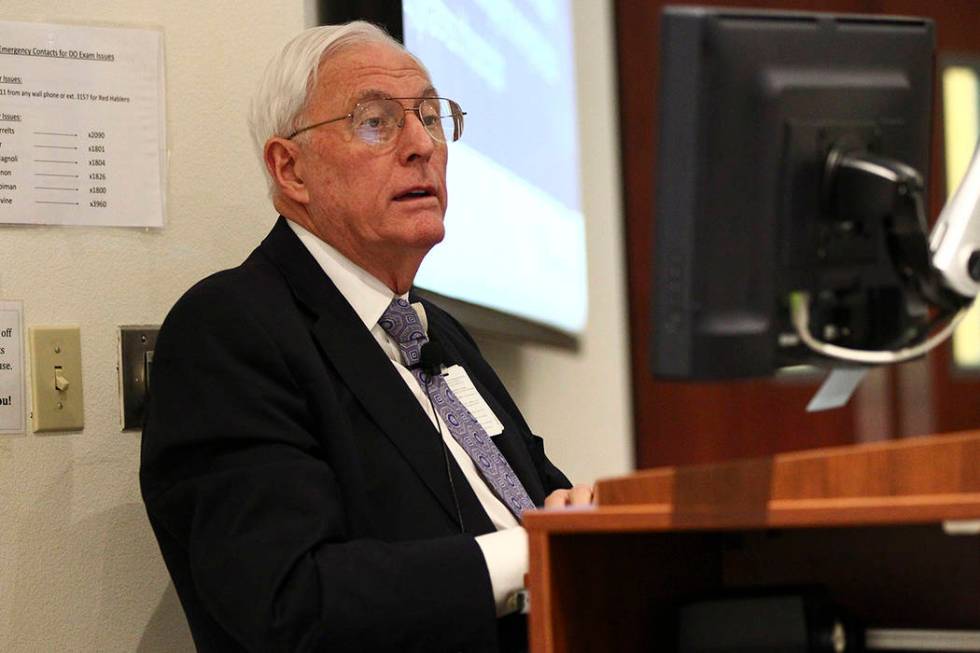Las Vegas tops list of cities facing worst shortage of OB-GYNs

New research showing that greater Las Vegas is at the highest risk in the U.S. for a worsening shortage of OB-GYNs comes as no surprise to members of the local medical community.
“We already are short in pretty much every field, except plastic surgery and anesthesiology,” said Dr. Don Havins, associate dean at Touro University Nevada in Henderson, the state’s largest medical school. However, obstetrics and gynecology is one specialty where the shortage is particularly acute, he added.
To be on par with the national average, Southern Nevada needs roughly 90 additional general OB-GYNs, Havins said, citing a 2018 study of the physician workforce by UNR’s School of Medicine.
A confluence of factors, including a high percentage of OB-GYNs nearing retirement age, puts Las Vegas at the top of the list of the 50 largest U.S. metropolitan areas surveyed in a study released Wednesday by Doximity, an online network of medical professionals that counts 70 percent of U.S. doctors among its members.
The study notes that the American Congress of Obstetricians and Gynecologists forecasts a nationwide shortage of up to 8,800 practitioners in the field by 2020 and 22,000 by 2050.
A doctor shortage can lead to delays in patients receiving care or result in patients leaving the area for care, said Dr. Amit Phull, medical director and vice president of strategy and insights at Doximity. Over time, a shortage can result in medical complications, he said.
Millennials most impacted
A shortage might be felt especially by millennials, who are entering child-bearing age and starting to have families, said Christopher Whaley, the study’s lead author.
According to the study, here’s how Las Vegas stacked up in key areas:
No. 2, behind Pittsburgh, for the highest percentage of OB-GYNs older than 55 (41 percent). The national average is 35 percent.
No. 3, behind Bridgeport, Connecticut, and Detroit, for the lowest percentage of OB-GYNs younger than 40 (15 percent). The national average is 19 percent.
No. 2, behind Riverside, California, in workload, with Las Vegas OB-GYNs delivering on average 146 babies per year. The national average is 100.
“The metropolitan areas with the older OB-GYNs and higher workloads will have a greater risk of shortages,” the study states. “Conversely, the metropolitan areas with younger OB-GYNs and lower workloads will have a lower risk of shortages.”
The study also ranked Las Vegas No. 5 in terms of the highest percentage of deliveries funded by Medicaid (about 50 percent), which reimburses doctors at a lower rate than other forms of insurance. Insurance companies also reimburse Las Vegas doctors at lower rates than in many other areas of the country, doctors said in interviews.
These findings place Las Vegas at greatest risk for a shortage of doctors in a specialty that many women, especially younger women, rely upon for primary care.
The study analyzed federal data, board-certification data and self-reported data from 43,000 full-time, board-certified OB-GYN practitioners.
Homegrown solutions
To address physician shortages, Nevada is growing its own doctors through its medical schools and residencies, said Touro University’s Havins.
“I believe there needs to be an emphasis on accepting Nevada medical school graduates into Nevada residency programs,” he said, noting that research shows there is then a much better chance of keeping them in the state to practice.
“We also need to recruit doctors from outside,” he said, adding that the Nevada Legislature this year allocated $500,000, which will be matched by the federal government, for helping doctors who come to Nevada repay their student loans.
Dr. Michael Gardner, vice dean of clinical affairs at the UNLV School of Medicine and an OB-GYN himself, described obstetrics as an “arduous specialty,” noting that “not all babies come between 9 and 5, Monday through Friday,” meaning doctors work long days and nights.
A new generation of doctors doesn’t “want to work 80 to 90 hours per week” and seeks greater work-life balance, he said. One way the issue is being addressed is through larger OB-GYN practices, with better on-call coverage.
Gardner also predicted that if the shortage progresses, nurse practitioners and midwives will play a larger role in providing care.
Las Vegas poses some unique recruitment challenges. said Dr. Carl Allen, an OB-GYN and senior medical director for Southwest Medical.
“One of the barriers to recruiting for Las Vegas is Las Vegas itself,” he said.
Job candidates may view the city as more of a vacation destination than a place to work and raise a family, said Allen, who noted that Southwest Medical pays OB-GYNs recruitment bonuses.
The hook, he said, is to “get them on the ground” in Las Vegas, where they can see the city for the community that it is and not simply the Strip. They also can witness a medical community that he described as having strong providers and support staffs, along with competitive salaries.
Allen, who has been in Las Vegas for 22 years, said he’d never been more optimistic about the medical landscape here. He noted that the recent addition of major sports teams is giving the city a new edge in recruiting by offering an amenity found in most major cities.
Contact Mary Hynes at mhynes@reviewjournal.com or 702-383-0336. Follow @MaryHynes1 on Twitter.